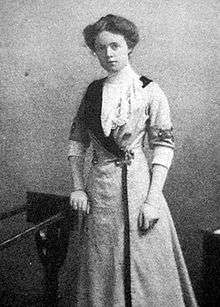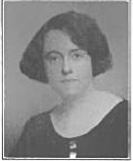I. A. R. Wylie
| I. A. R. Wylie | |
|---|---|
 I. A. R. Wylie in Germany, c. 1910 | |
| Born |
Ida Alexa Ross Wylie 16 March 1885 Melbourne, Australia |
| Died |
4 November 1959 (aged 74) Princeton, New Jersey, USA |
| Other names | Ida Alena Ross Wylie |
| Occupation | Writer, poet |
Ida Alexa Ross Wylie (16 March 1885 – 4 November 1959), known by her pen name I. A. R. Wylie, was an Australian-British-American novelist, screenwriter, short story writer, and poet who was honored by the journalistic and literary establishments of her time, and was known around the world. Between 1915 and 1953, more than thirty of her novels and stories were adapted into films, including Keeper of the Flame (1942), which was directed by George Cukor and starred Spencer Tracy and Katharine Hepburn.
Biography
Early life
Wylie was born Ida Alexa Ross Wylie on 16 March 1885 in Melbourne, Australia to Alexander Coghill Wylie from England and Ida Ross, a farmer's daughter from Australia.[1][2] I. A. R. Wylie's father, Alec Wylie of England, was in debt much of his life and often on the move from creditors.[2] And so it was that sometime in the 1880s he fled England for Australia, but not before divorcing his first wife while proposing to her sister, Christine (who refused).[2] In Australia, he soon married a plain farmer's daughter named Ida Ross.[2] The couple's first child, I. A. R. Wylie, was born in Melbourne, Australia in 1885, literally named after her parents: Ida Ross and Alec Wylie.[2] In 1888, Alec moved back to London with his new wife and young child, but Ida Ross died shortly thereafter.[2] Alec then renewed relations with Christine, his first wife's sister, and Christine became the young Wylie's home school teacher and guardian, raising her while her father struggled from one crisis to the next. "Christine was just the first of a line of women who proved far stronger and more reliable than any man in Ida's life."[2]
Early writing career

After spending three years in finishing school in Belgium, Wylie first studied in England, and later in Germany, where she also taught and began writing.[1] Wylie's self-education at home meant she spent many hours making up her own stories to fill up time, and, at the age of 19, she sold her first short story to a magazine.[2] For example, Wylie had a roommate named Esme who had been raised in India and so she wrote stories based on Esme's reminisces.[2] Wylie went on to write at least five books based in India, The Native Born, or, The Rajah's People (1910); The Daughter of Brahma (1913); Tristram Sahib (1915); The Temple of Dawn (1915); and The Hermit Doctor of Gaya (1916). While living in Germany in the early 1910s, she wrote a number of books including My German Year (1910); Rambles in the Black Forest (1911); The Germans (1911); and Eight Years in Germany (1914).[2] Her novel, Towards Morning (1918), was "perhaps the first in English to suggest that not all Germans were evil imperialists."[2]
In 1914, Wylie returned to England just prior to the war, and joined the Suffragette movement.[2] She provided a safe house for women who were released from prison where they could recover from hunger strikes without being watched by the police.[2] She struck up a friendship with a woman named Rachel. In 1917, Rachel and Wylie traveled to America where they bought a car and roamed around the country, from New York to San Francisco, a remarkable journey with the state of roads and cars at the time.[2]
Hollywood
Wylie eventually settled in Hollywood where she sold her stories.[2] Over thirty movies were made between 1915 and 1953 based on her works, including Torch Song (1953) and Phone Call from a Stranger (1952).[3] Her story, "Grandmother Bernle Learns Her Letters", published in the Saturday Evening Post in 1926, was filmed twice—by John Ford in 1928 as Four Sons, and by Archie Mayo in 1940, also as Four Sons.[2] She is probably best known as the author of the novel that became the basis of the film Keeper of the Flame (1942), directed by George Cukor and starring Spencer Tracy and Katharine Hepburn.[2]
Personal life
"Neither Baker nor Wylie ever declared themselves openly as lesbians, but according to Dr. Bert Hansen’s article, "Public Careers and Private Sexuality: Some Gay and Lesbian Lives in the History of Medicine and Public Health", the two women were partners."[2][4] Other authors have identified her as a lesbian including Laura Doan in Fashioning Sapphism: The Origins of a Modern English Lesbian Culture,[5] Anne McMay in Wolf Girls at Vassar: Lesbian and Gay Experiences 1930-1990[6] and Lesbian lives: Biographies of Women from the Ladder.[7]
In her autobiography My Life with George, in which the "George" of the title is her subconscious ego, Wylie says:
- "I have always liked women better than men. I am more at ease with them and more amused by them. I too am rather bored by a conventional relationship which seems to involve either my playing up to someone or playing down to someone. Here and there and especially in my latter years when there should be no further danger of my trying to ensnare one of them I have established some real friendships with men in which we meet and like each other on equal terms as human beings. But fortunately, I have never wanted to marry any of them, nor with the exception of that one misguided German Grenadier, have any of them wanted to marry me."[8]
In her autobiography she acknowledges that many of her women friends refer to her as "Uncle," and as one critic says, her choice of being credited as "I. A. R. Wylie" instead of Ida Wylie was certainly an attempt to downplay her gender in publications.[2][8][4]
In the 1930s, Wylie, Sara Josephine Baker and another pioneering woman physician, Dr. Louise Pearce, settled on a property near Skillman, New Jersey called Trevenna Farm.[2] They lived there together until Baker died in 1945, followed by Pearce, and then later Wylie who died on 4 November 1959 at the age of 74.[2]
Works
- The Native Born, or, The Rajah's People (1910)
- My German Year (1910)
- Rambles in the Black Forest (1911)
- The Germans (1911)
- Dividing Waters (1911)
- In Different Keys (1911)
- The Daughter of Brahma (1913)
- The Red Mirage (1913)
- The Paupers of Portman Square (1913)
- Five Years to Find Out (1914)
- Eight Years in Germany (1914)
- Tristram Sahib (1915)
- The Temple of Dawn (1915)
- Happy Endings (1915)
- The Hermit Doctor of Gaya (1916)
- Armchair Stories (1916)
- The Duchess in Pursit (1917)
- Towards Morning (1918)
- The Shining Heights (1918)
- All Sorts (1919)
- Holy Fire: And Other Stories (1920)
- Children of Storm (1920)
- Brodie and the Deep Sea (1920)
- Rogues & Company (1921)
- The Dark House (1922)
- "Jungle Law" (1923)
- Side Shows (1923)
- Ancient Fires (1924)
- Black Harvest (1926)
- The Mad Busman, and Other Stories (1926)
- The Silver Virgin (1929)
- Some Other Beauty (1930)
- The Things We Do, and Other Stories (1932)
- Prelude to Richard (1934)
- To The Vanquished (1934)
- A Feather in Her Hat (1934)
- The Novels of Elinor Wylie (1934)
- The Inheritors, and, With Their Eyes Open (1936)
- Furious Young Man (1936)
- The Underpup (1938)
- The Young in Heart (1938)
- My Life With George: An Unconventional Autobiography (1940)
- Strangers Are Coming (1941)
- Keeper of the Flame (1942)
- Flight to England (1943)
- Ho, the Fair Wind (1945)
- Storm in April (1946)
- Where No Birds Sing (1947)
- Candles for Therese (1951)
- The Undefeated (1957)
- Home are the Hunted (1959)
- Claire Serrat (1959)
References
- 1 2 Eder, Bruce. "I A R Wylie: Full Biography". The New York Times. Retrieved 10 May 2014.
- 1 2 3 4 5 6 7 8 9 10 11 12 13 14 15 16 17 18 19 20 21 Bigelow, Brad (27 May 2012). "My Life with George: An Unconventional Autobiography". The Neglected Books Page. Retrieved 10 May 2014.
- ↑ "I. A. R. Wylie". Internet Movie Database. Retrieved 10 May 2014.
- 1 2 Dr. Bert Hansen. "Public Careers and Private Sexuality: Some Gay and Lesbian Lives in the History of Medicine and Public Health"
- ↑ Laura Doan (2013). Fashioning Sapphism: The Origins of a Modern English Lesbian Culture. Columbia University Press. p. 12. Retrieved 20 October 2014.
- ↑ Anne McKay (1992). Wolf Girls at Vassar: Lesbian and Gay Experiences 1930-1990. p. Forward. Retrieved 20 October 2014.
- ↑ Barbara Grier (1976). "I.+A.+R.+Wylie"+lesbian Lesbian lives: Biographies of Women from the Ladder. Diana Press. p. 419. Retrieved 20 October 2014.
- 1 2 Ida Alexa Ross Wylie. My Life with George
Further reading
- Wylie, I. A. .R. (June 1914). "About Myself". The Book News Monthly. Volume 32, Part 2. pp.467–469.
- Starr, Meredith (1921). "I. A. R. Wylie". Future of the Novel: Famous Authors on Their Methods; A Series of Interviews with Renowned Authors. Boston: Small, Maynard & Company. pp. 124–125.
- Wylie, I. A. R. (April 1922). "Release". Good Housekeeping. Volume 74. p. 16–22 and 156–166.
External links
- Works by I. A. R. Wylie at Project Gutenberg
- Works by or about I. A. R. Wylie at Internet Archive
- Works by or about Ida Alexa Ross Wylie at Internet Archive
- Works by I. A. R. Wylie at LibriVox (public domain audiobooks)

- Articles published by I. A. R. Wylie in Harper's Magazine
|